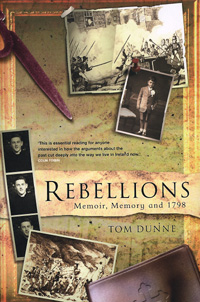15 April 2004 Edition
A waste of woodpulp

Book Review
REBELLIONS
MEMOIR,
MEMORY and 1798
By Tom Dunne
Published by Lilliput Press
Books like this one make me sad.
Why? Because I like trees.
First there was the quote on the front cover from revisionist Colm Toibin that this book is "essential reading for anyone interested in how the arguments about the past cut deeply into the way we live in Ireland now". I suppose that should have been warning enough, however, I ploughed on.
The author is Professor Emeritus of History at University College Cork.
His memoir is that of a Christian Brother who "moved away from a nationalist view of Irish history".
This is the personal journey of a Castle Catholic, justifying to himself why it is ok to be a collaborator.
Much of his musings take place in 1998, when the Tour de France came to Ireland - Bliana na bhFrancach á la Bord Fáilte. To use the French analogy, what we have here is someone with ancestors in Le Resistance contorting what they did to some pro-German civilians in a byre in Normandy in 1944 to make him feel better about being part of a contemporary Vichy elite.
Scullabogue was an atrocity — the inevitable bow wave of any conflict. That is not an excuse — merely an explanation. But to distil 1798 down to the events in Scullabogue is an atrocity in historiography.
I am well used to people thinking of 1798 Rebellion and thinking Wexford.
With my own Mayo background, the events around Killala and Castlebar later that year have always, to my view, been somewhat ignored. Moreover, McCracken's contribution in Antrim is equally lost from view if we see that seminal year in Irish history as the story of Father Murphy and Vinegar Hill.
Here we have revisionism indulged from academia, the West Brit vanity press complete with rambling personal memoir of over a hundred pages. It is a therapy narrative about his formative years and how he was scarred as a teenager in the Christian brothers. His experiences as a novice Brother in the late '50s have had an effect on everything else he has done and how he thinks about the world.
The book spends 50 pages on the Bicentenary commemoration and 120 on the Battle of Ross — focusing mainly on the massacre at Scullabogue.
Dunne focuses on Scullabogue to make him feel better about the fact that he abandoned principles that ensured that the part if Ireland he grew up in wasn't under the crown.
Selective amnesia & denial? Dunne has plenty of that. Don't waste your time on this one.
Shame about those trees.
BY MICK DERRIG


